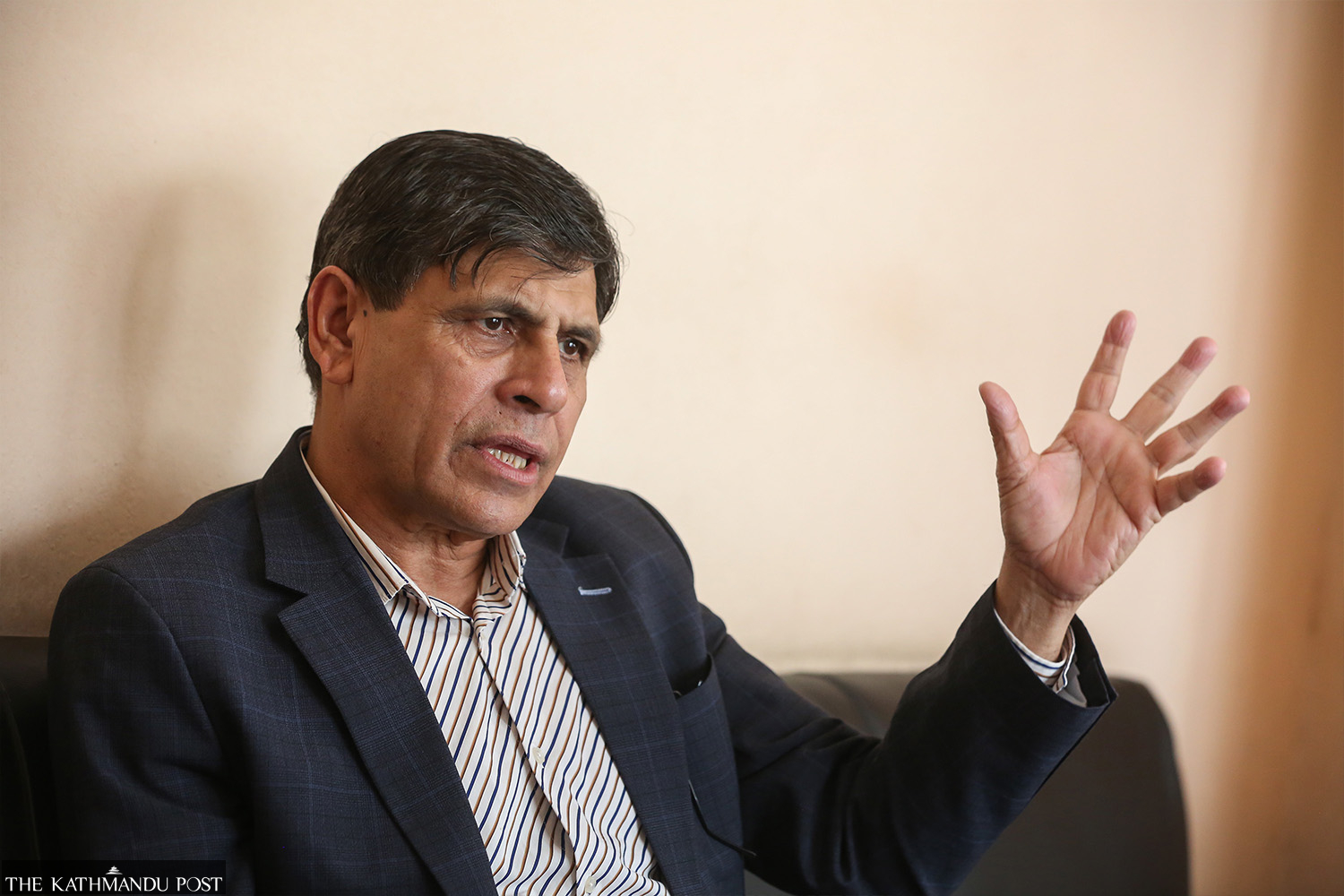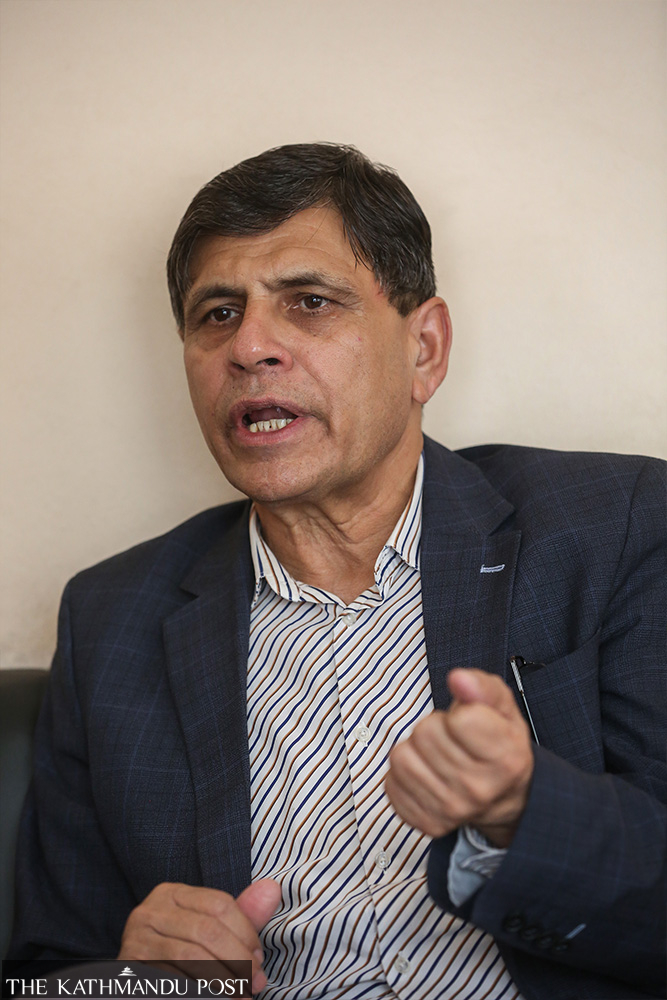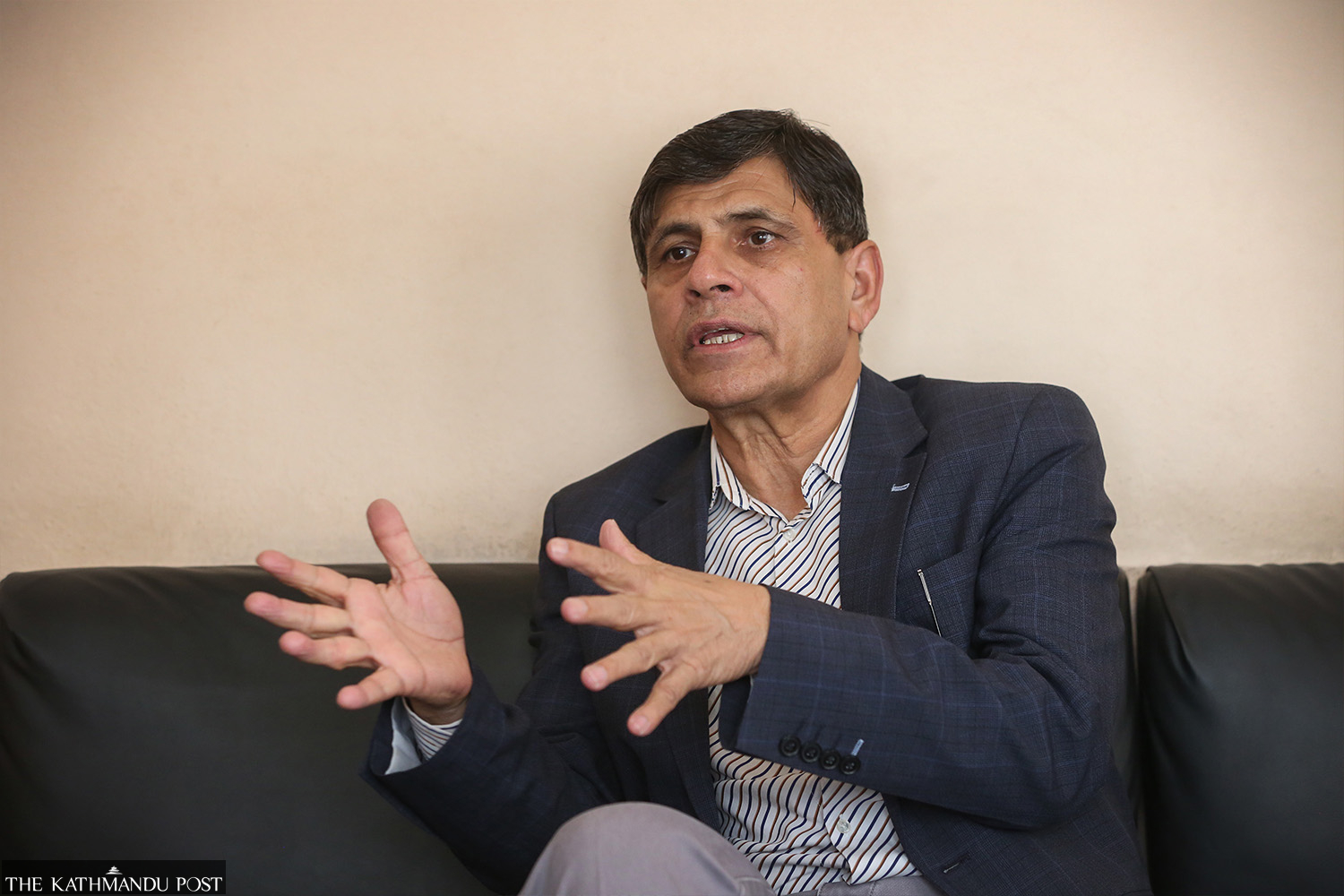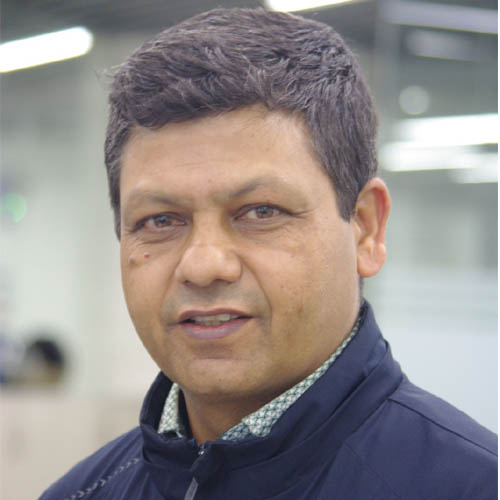Interviews
If Oli continues to manoeuvre, there might be other coalitions
In the long-run we will be in competition with the Congress but to safeguard democracy we should be together.
Thira Lal Bhusal
The CPN (Unified Socialist), which was fashioned in 2021 by a splinter faction of the CPN-UML, is preparing to hold its first general convention. The party has done poorly in all elections since its establishment. It has also failed in service delivery despite continuously being in the government since its inception. The Post’s Thira Lal Bhusal caught up with the party’s General Secretary, Ghanashyam Bhusal, for insights about the Unified Socialist’s upcoming general convention and broader political dynamics.
Your party is holding its first general convention in a few weeks. What new things does the party have to offer?
Our party was born in the context of sharp division between political forces over the issue of Parliament dissolution by then prime minister KP Sharma Oli, chairman of the CPN-UML, which was then also our party. That was the immediate reason for the party split. But there were other disputes within the UML. The differences were about the political line and party orientation. After Oli’s election as the party leader, policy issues were undermined. In fact, we were at odds because of the policy issues.
What were those policy disputes?
We [our faction] believed that after the establishment of democratic republic system, the fight for a political system was almost over as this is the most progressive political system of our time. We stressed that now the political line and programmes of the party should be updated and the focus shifted to attaining prosperity. Democracy can’t be sustained if we can’t promote industry, create jobs and ensure good governance. So we have to orient our policies to ensure these achievements. In our country, comprador capitalists, who want to earn money without running industries, are dominant. They shift the state’s policies in collusion with politicians, bureaucrats, police and other state agencies. Likewise, the economic policy doesn’t talk about jobs and production but only growth and development. These factors are detrimental to our economy. We wanted to change these policies and dynamics.
We had differences on these issues with Oli. When we were debating them with him, the Parliament dissolution created a sort of abnormal situation. We stood against it, defying our party chief Oli. That division eventually led to the party split. Many people, including leaders in our own party, saw Parliament dissolution as the only reason behind the birth of our party. The new party was confused about the way forward. The upcoming general convention will formulate clear policies in this connection.

What about the leadership? Will the party get new leadership?
For the past two decades, I have been advocating that a communist party should adopt the right programmes to bring about social changes. At the time, the Maoists had a policy of seizing state power through force, and the UML was talking only about transforming society through elections. But the UML was basically engaged only in winning elections. In this context, we [a group of UML leaders] came up with some policies that would make substantive changes in such ritualistic practices.
Now, I have been saying that our party should be led by a leader who can internalise and effectively implement those policies. We have almost finalised the party’s policy documents. When the documents are circulated among party workers, the debate about who is eligible to implement these policies will start.
You often claim to be the proponent of the CPN (Unified Socialist)’s party line. If so, will you claim party leadership to implement those policies?
The first condition to become the party leader is that he/she should internalise the policies and programmes adopted by the party. I shouldn’t say that no one besides me has internalised them. It is true that I have been actively leading the debates and discussions to introduce new policies in the party. Party representatives will debate and decide this at the convention.
A large number of senior leaders quit the UML to form this party. But it couldn’t even retain its members let alone further expand.
There was a need for radical reforms and restructuring in communist organisations and their policies. This should have been done by the country’s largest communist party—the CPN-UML. But the party leadership and its rank and file didn’t realise the need for it. There was no serious policy discussion in the UML. While the leadership of the CPN (Unified Socialist) and its organisation are oriented in the right direction, it’s not properly trained for such restructuring. Therefore, many even accused the party leadership of being just a follower and subservient to the Nepali Congress and the Maoist Centre. Various sections of society who had praised us for standing against Oli’s wrong decision didn’t appreciate other political moves of our party. Parliament dissolution was a political event. A party needs clear programmes and agenda to keep public support. Unfortunately, we were found wanting in this regard. We should have done something in job creation and increasing production. We will make such things clear at the upcoming convention.

Since its formation, the party has been constantly bickered over power sharing with other parties and even party leaders always seem to be wrangling for ministerial berths. Don’t you think such activities weaken the party?
This happened as the party lacked clear policies to move ahead. Standing against Oli became sort of its policy as there was deep resentment against him. As far as the leaders’ attachment to power is concerned, the party was born out of power [from Parliament, not from the ground]. So the struggle for power is linked to its genesis. It has been in power ever since its establishment. These allegations were hence natural, and the party leadership couldn’t clarify things. We couldn’t show what we did for the betterment of the society.
Party chair Madhav Kumar Nepal and other top leader Jhalanath Khanal seem to be working at cross-purposes. Nepal seems closer to the Congress while Khanal has been consistently lobbying for an alliance with the UML and the Maoist Centre.
We have almost resolved this issue in the course of finalising the party’s policy document. Our conclusion is that, in general, the Congress mainly represents neoliberals and comprador capitalists. When we lobby for the country’s independent economic policy, the Congress may not agree. The party tilts more towards pro-western ideas in the name of liberalism. We in our party are in consensus that in the long-run we will compete against the Congress. But we shouldn’t forget that we got the current democratic system and the constitution only after fighting jointly with the Congress. So we have to keep our doors open for collaboration with the Congress in order to safeguard this system and the constitution. It is also historically proven that the Congress and left forces should stand together to safeguard democratic system. Thus we have now made our theoretical standing clearer.
But in practical aspects, as you said, there are some differences. Party chair doesn’t want to increase distance with the Congress as he worked closely with Congress President Sher Bahadur Deuba and other leaders to fight Oli ji. But Jhalanath Khanal ji is for left alliance.
While there are already major communist forces such as the CPN-UML and the Maoist Centre, why is one more communist force, CPN (Unified Socialist), needed? How do you prove your relevance?
The CPN-UML didn’t follow the right policies, even those endorsed by its general conventions. Party chief Oli wants total control of the party organisation, from the centre to the local units. The entire party is mobilised mainly to realise Oli’s personal ambitions. This party can’t work in favour of the society in the long run. The Maoist Centre hasn’t succeeded in transforming itself from war-era rigidity of Maoism. The Unified Socialist is here to correct these two major deviations of Nepal’s communist movement. Had the party raised this issue prominently right since its formation, people would have understood its relevance. We will do it now. This convention will be a landmark event in this connection as well.

Many people think that the Unified Socialist will ultimately merge with the UML.
Merger is not a solution. Even if you want to bring two parties together, you have to unify them. A merger brings top leaders together based on power sharing, just like the merger of the UML and Maoist Centre in 2018. Such a merger is guided mainly by the interests of certain leaders. That’s why the merger didn’t last. The need now is unification among communist parties based on policies and programmes. Otherwise, it will be nothing more than a gathering of leaders. There is no point in merging the party to make the UML bigger and make Oli prime minister one more time.
As a leader of a ruling coalition partner, how confident are you of the stability of this alliance?
Given the composition of the present Parliament, we can’t rule out the making and breaking of different coalitions until the next election. Oli ji used to talk of the Unified Socialist as a tumour removed after a surgery. His mindset that he can do anything in Nepali politics has suffered a setback. Therefore, he became ready for this coalition. If he has realised this change, this coalition will last. But if he again tries to manoeuvre to justify his dissolution of Parliament and serve any other interests, there might even be other coalitions.
Why has your party been in a state of disharmony with coalition partners right from the beginning?
Initially, the prime minister didn’t consult with us while making this coalition. That created misunderstanding. He eventually admitted his mistake in failing to inform us on time and sought our support. So, that chapter was closed. Now we have no issue at the party’s level, and officially, we are committed to this coalition.




 18.12°C Kathmandu
18.12°C Kathmandu




.jpg&w=200&height=120)







